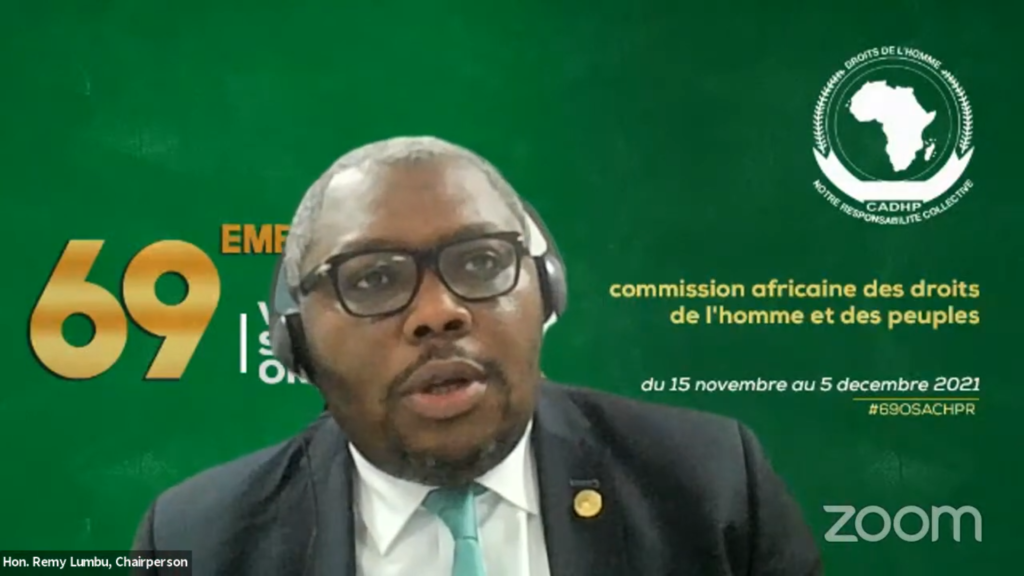The Chairperson of the African Commission on Human and Peoples’ Rights (ACHPR), Commissioner Rémy Ngoy Lumbu, has called on the media to initiate dialogue with human rights defenders and support their efforts to advance human rights, the rule of law, social change and development on the African continent.
In his Intersession Report presented during the 73rd Ordinary Session of the Commission in Banjul, The Gambia, from October 20 to November 9, 2022, Commissioner Lumbu, who is also the Commission’s Special Rapporteur on Human Rights Defenders and Focal Point on Reprisals against Human Rights Defenders in Africa, urged the media to “work in solidarity with human rights defenders to enable them to be well informed and to inform the public properly.”
In his analysis, he noted that the situation of human rights and human rights defenders in Africa has evolved positively in some countries while in others it continues to deteriorate, and urged States to develop and implement stronger and more adequate national laws, policies and programs for the protection of human rights defenders.
Noting the freedom of assembly and peaceful protest are fundamental to collective expression and the defence of all human rights, Commissioner Lumbu said “this right is often subject to restrictions in some States Parties”.
According to him, some States continue to use Covid-19 related preventive measures to unduly restrict the freedom of association and assembly, particularly for opposition political actors, civil society and human rights defenders while in other countries, a state of emergency for security reasons has also become a means of restricting the right to assembly.
He recalled that the Commission developed Guidelines on Freedom of Association and Assembly in Africa which it adopted to assist States Parties, including policy makers, law drafters and legislators, to ensure that legislation, policies and administrative practices are in line with best practices and international standards and that measures do not unjustifiably infringe on the freedoms of association and assembly.
Commissioner Lumbu encouraged States to make use of the Guidelines and noted the important role of national courts in ensuring the freedoms of association and assembly. He also called on national human rights institutions and NGOs to monitor the implementation of the Guidelines and to share information relevant to his mandate.
He noted that acts of reprisal against human rights defenders are still very present in various forms, including systematic harassment, undue restrictions on access to meetings of human rights bodies, various threats, physical violence and other abuses, unjustified restrictions on the activities of civil society organizations, spying, burglary of the headquarters of organizations and associations, defamation, suspension of accreditation, arbitrary arrests and detentions, and repetitive legal proceedings, among others.
Commissioner Lumbu said such cases of reprisals are common to all countries, although the degree of seriousness varies from country to country. But he said he has continued to work with States on the proper implementation of human rights norms and standards relating to human rights defenders, notably through recommendations on State reports, country visits, fact-finding missions, urgent appeals and other means.
He said he continues to review laws and policies that impose restrictions on public freedoms and reduce the role and operational space of civil society actors as well as strengthen collaboration with all human rights defenders and pursue the dialogue with States and other stakeholders.
Commissioner Lumbu urged states to publicize laws on human rights defenders among administrative, judicial and security authorities in order to remove all forms of restrictions on the work of human rights defenders while also ensuring that draft laws on the protection of human rights defenders are in line with international legal standards in order to create a legal environment favorable to their work.
He appealed to States to refrain from adopting repressive laws that restrict the civic space and legitimate activities of human rights defenders to promote and defend human rights and, instead, to adopt special laws to address the protection of human rights defenders during health and security crises or other continental or global crises.
In addition, he called on States to ensure that mechanisms established for the protection of human rights defenders are inclusive and have representatives of civil society in their composition, adding that they should engage in dialogue and consultation with human rights defenders and publicly recognize and support their work through communication and information campaigns.
Commissioner Lumbu urged States to raise awareness and build the capacity of different actors, including defenders, on the laws and regulations governing the promotion and protection of human rights and take all appropriate measures to ensure that defenders are able to carry out their activities in conditions of security, free of any threats to their physical and moral integrity.
He asked them to pay particular attention to the situation of women human rights defenders, which remains a constant concern for him, and establish adequate mechanisms for the reparation of damages suffered by human rights defenders in the course of their work.
Commissioner Lumbu called on States to refrain from deregistering NGOs and civil society organizations that work to promote and protect human rights and strengthen civic and democratic space by promoting freedom of expression, association, and peaceful assembly for all human rights defenders.
He urged them to ensure that measures taken by States to combat terrorism are consistent with the Commission’s Declaration of Principles on Freedom of Expression in Africa and the Principles and Guidelines on Human and Peoples’ Rights while Countering Terrorism in Africa.







